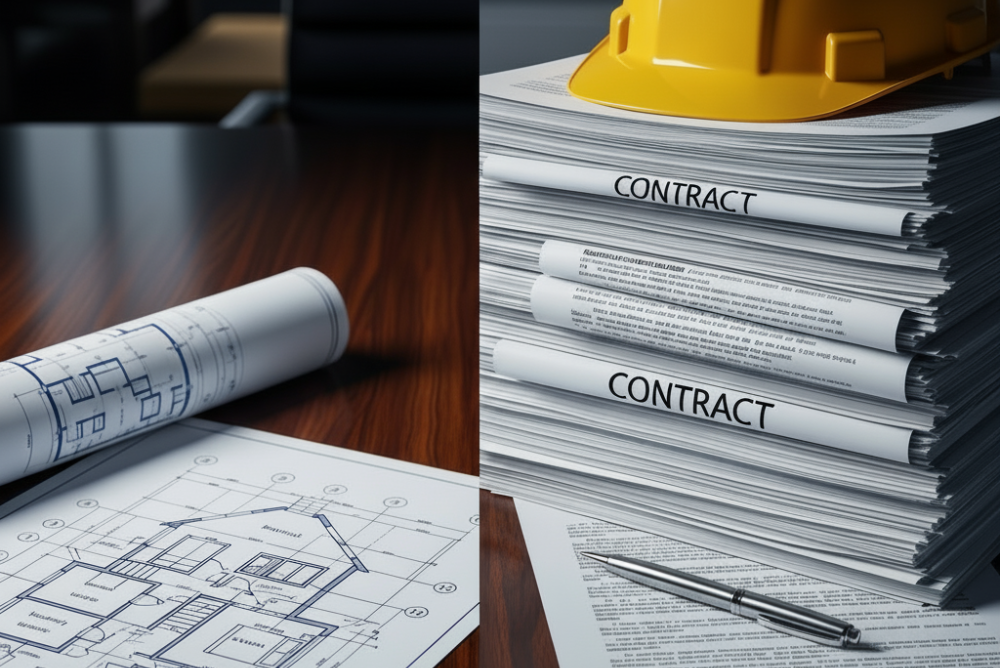

Starting a home improvement project in Wisconsin? Whether you’re a contractor or a homeowner, understanding the state’s contract requirements can save you from costly mistakes and legal troubles. Wisconsin’s Chapter ATCP 110 – HOME IMPROVEMENT PRACTICES sets clear rules that protect both parties in home improvement deals.
This guide breaks down everything you need to know about Wisconsin’s home improvement contract requirements in plain English. We’ll cover what must be in your contract, why lien waivers matter, permit requirements, and the serious penalties for breaking these rules.
Not every home improvement job requires a written contract in Wisconsin, but most do. You must put your agreement in writing if:
These rules exist because advance payments and off-site sales create higher risks for homeowners. A written contract protects everyone involved.
Your contract must include your complete business information:
This transparency helps homeowners know exactly who they’re working with and who’s responsible for the project.
You need to clearly describe the work you’ll perform. This includes:
The more specific you are, the better. Vague descriptions lead to disputes and unhappy customers.
Your contract must clearly state:
Hidden costs are prohibited. You must disclose all charges upfront, including financing charges, permit fees, and installation costs.
Include specific dates for:
Clear timelines prevent misunderstandings and give homeowners realistic expectations.
You must include details about any warranties you provide:
Don’t make warranty promises you can’t keep. The law prohibits giving warranties you don’t intend to honor.
Lien waivers might be the most important protection for Wisconsin homeowners, yet many don’t understand them. Here’s what you need to know:
Before signing any contract, you must give homeowners this exact written notice:
Notice of Consumer’s Right to Receive Lien Waivers
If a consumer requests lien waivers, a seller of home improvement services must provide lien waivers from all contractors, subcontractors, and material suppliers. This Wisconsin law protects consumers from having liens filed against their property. Lien waivers prevent the filing of a lien on your home in the event that a contractor does not pay suppliers or subcontractors.
For more information about home improvement law, contact the Wisconsin Consumer Protection Bureau at 1-800-422-7128 or www.datcp.wi.gov.
This notice must be:
When homeowners request lien waivers, you must provide written waivers from:
Unless the homeowner specifies the request applies only to final payment, you must provide waivers with every partial payment too.
Without proper lien waivers, homeowners could pay you in full but still face liens on their property if you don’t pay your suppliers or subcontractors. This double payment scenario destroys trust and creates legal nightmares.
Understanding how mechanic’s liens attorneys can help protect both contractors and property owners is essential for avoiding these complications.
Wisconsin requires strict compliance with permit and inspection requirements:
When state or local laws require inspections:
These rules ensure your work meets safety standards and local codes.
Wisconsin law specifically forbids many common problems in the home improvement industry:
You cannot:
You cannot:
You cannot:
Wisconsin doesn’t take contract violations lightly. The penalties are severe and designed to protect consumers:
Customers who suffer monetary losses can sue you directly under Wisconsin Statute 100.20(5). They can recover:
The state can prosecute violations under Wisconsin Statutes 100.20(6), 100.26(3), or 100.26(6). Criminal penalties can include fines and potential jail time.
The Wisconsin Department of Agriculture, Trade and Consumer Protection can impose additional penalties and sanctions.
These aren’t empty threats. Wisconsin actively enforces these laws. A contractor who fails to provide proper contracts, lien waivers, or warranties could face:
If you’re facing contract disputes or regulatory issues, experienced construction law attorneys can help protect your business and navigate complex compliance requirements.
If you provide basement waterproofing services, additional strict rules apply:
You must provide a written analysis of:
Any guarantee must:
If you don’t guarantee your basement waterproofing work, you must include this exact statement on your contract in bold type:
THE BASEMENT WATERPROOFING SERVICES PROVIDED BY THIS CONTRACT ARE NOT GUARANTEED.
You cannot change materials or products without the buyer’s consent:
For written contracts, any changes must be in writing except for verbal changes that:
Keep detailed records of any authorized changes, including how the buyer communicated approval and when it occurred.
Develop standardized contract templates that include all required elements. This ensures you never miss important details and speeds up your sales process.
Professional construction contract review services can help you develop compliant templates that meet Wisconsin’s specific requirements.
Make sure everyone who sells for your company understands these requirements. One uninformed salesperson can create expensive legal problems.
Create checklists for:
Document everything:
Laws change. Review your contracts and procedures annually with a lawyer familiar with Wisconsin construction law.
Wisconsin’s home improvement contract requirements might seem overwhelming, but they protect your business as much as your customers. Proper contracts:
The penalties for violations are severe because these protections matter. Homeowners invest significant money in improvement projects, often borrowing against their homes’ equity. They deserve clear contracts, honest representation, and professional service.
Don’t wait for a problem to review your contracts and procedures. The cost of compliance is minimal compared to the potential penalties for violations. Whether you’re a contractor or homeowner, understanding these rules protects your investment and ensures successful projects.
If you’re a contractor, review your current contracts against these requirements. If you’re a homeowner, use this information to evaluate contractors and protect yourself from problems. Or contact us online for a free consultation.
Remember: Wisconsin’s Department of Agriculture, Trade and Consumer Protection is available at 1-800-422-7128 or www.datcp.wi.gov for additional information and assistance.
Professional home improvement projects benefit everyone when they’re done right. Wisconsin’s clear rules make that possible – but only if you follow them.
Karalynn Cromeens is the Owner and Managing Partner of The Cromeens Law Firm, PLLC, with over 17 years of experience in construction, real estate, and business law. A published author and passionate advocate for contractors, she has dedicated her career to protecting the businesses her clients have built. Karalynn is on a mission to educate subcontractors on their legal rights, which inspired her books Quit Getting Screwed and Quit Getting Stiffed, as well as her podcast and The Subcontractor Institute.

